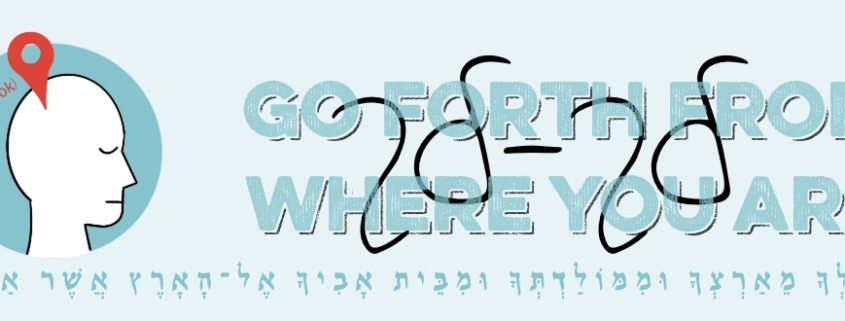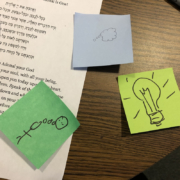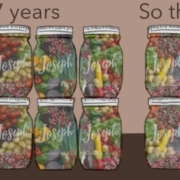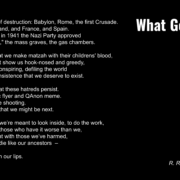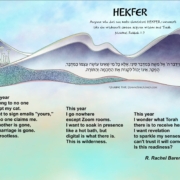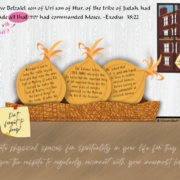Lech Lecha: Journeying Inside and Out

Part of an ongoing series that explores Torah through an ethic of social justice and building a world worthy of the Divine.
Lech-Lecha opens with the instruction to go on a journey:
וַיֹּ֤אמֶר יְהֹוָה֙ אֶל־אַבְרָ֔ם לֶךְ־לְךָ֛ מֵאַרְצְךָ֥ וּמִמּֽוֹלַדְתְּךָ֖ וּמִבֵּ֣ית אָבִ֑יךָ אֶל־הָאָ֖רֶץ אֲשֶׁ֥ר אַרְאֶֽךָּ׃
God said to Abram, “Go forth from your native land and from your father’s house to the land that I will show you.
וְאֶֽעֶשְׂךָ֙ לְג֣וֹי גָּד֔וֹל וַאֲבָ֣רֶכְךָ֔ וַאֲגַדְּלָ֖ה שְׁמֶ֑ךָ וֶהְיֵ֖ה בְּרָכָֽה׃
I will make of you a great nation, and I will bless you; I will make your name great, and you shall be a blessing.*
On the surface, God is simply telling Abram to leave home and go where God leads. The phrase lech-lecha is repetitive, though, and it doesn’t need to be. When the same word root appears twice in rapid succession like this, the grammar is waving a big flag: notice me! There’s something important here beyond the obvious. Is this doubling telling us something deeper?
Maybe this is a journey for Abram’s own good, as Rashi (d. 1105) teaches. Maybe it’s a journey toward the Land of Promise, per Ibn Ezra (d.1167). And maybe it’s an inner journey. Lech-lecha can be read as “go to yourself” or “go into yourself.” That interpretation is often attributed to Reb Nosson, the chief student and scribe of Hasidic master Reb Nachman of Breslov (d.1844).
So is it “go into yourself,” or “go forth from where you are”? Of course the answer is: it’s both.
Because of our calendar, we always read these lines with the Days of Awe reverberating in our souls. And that seems just right to me. The spiritual work of the high holidays takes us on a journey of introspection – that’s “go into yourself.” Now, as the new Torah cycle gets underway, that introspection fuels “go forth from where you are,” a journey of building a better world.
Both of these are part of teshuvah – which is a year-round spiritual practice, not just something we do during the Ten Days named after it. If we aren’t willing to journey inward, we’ll miss the inner roadblocks we need to clear away in order to build a world of greater justice. If we aren’t willing to journey outward, then our introspection is solipsistic navel-gazing.
To build an ethic of social justice into our lives and our Judaism, we need to find balance’s sweet spot. We need to journey inward enough to see where we’ve fallen short and what work we need to do. And we need to journey outward enough to take the next action, however small, in lifting each other up – pursuing justice – mitigating climate crisis – helping someone in need.
Our mystics teach (in Zohar, and in many later sources) that human beings have five levels of soul. We can imagine them like a ladder leading us “up” toward God. As we ascend that ladder, our souls grow progressively more elevated and spiritually refined. One might imagine that climbing a mystical spiritual ladder is a purely internal spiritual journey, but nope:
The highest two levels “have to do with …living with awareness of our connection to all humans and all living things. And to get to work on those levels, which are higher, we must be … in contact with other humans and other living things, aware and connected to their sufferings, mysteries and greatness.” (–Nelly Altenberger)
The path to the highest levels of inner work is through the outer work of connecting outside ourselves. In other words: our souls can’t reach their full potential unless we’re actively engaged with the world. The lech-lecha journey is inward and outward. And as we become aware of and connected to the sufferings, mysteries, and greatness of others, how can we fail to act?
Maybe that means helping HIAS support refugees in their lech-lecha journey. Or supporting Doctors Without Borders, which runs a range of activities in Ukraine to help people travel to health care facilities and access necessary medications. Speaking of health care facilities and necessary medications, NCJW is helping pregnant people in the United States do just that.
On a local level it might mean feeding someone who is hungry, or donating warm pajamas to families who struggle to afford warm clothes in winter, or weeding through your wardrobe for clothing to share with a local Trans Clothing Swap. It might mean helping native pollinators by leaving leaves under shrubs and bushes in fall and refraining from mowing in early spring.
And it might mean standing up for someone who’s being bullied or mistreated, or calling out a homophobic or racist “joke,” or speaking a kind word to someone who’s struggling. (And someone who seems fine could be fighting an inner battle to find reasons to stay alive. If that’s you, there is help.) We never know what impact our kindness and connection might have.
This week Torah calls us to go forth – into ourselves and into the world, to let our inner work fuel the outer work that is so needed. The climate crisis is intensifying. In the United States voting rights are at risk, and the inequality between rich and poor is staggering. The need for repair is vast. We who are comfortable must “go forth” to take action beyond our comfort zones.
That’s how our journey can make us a blessing to all the peoples of the Earth… and also to the ecosystems, and the other living beings, and the future of our fragile planet that now more than ever rests in our hands.

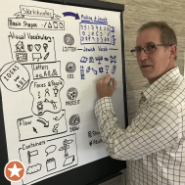
Rachel Barenblat is a founding builder at Bayit. She serves Congregation Beth Israel of the Berkshires and blogs as Velveteen Rabbi. Illustration by Steve Silbert, lead builder for Visual Torah and Bayit Games.

